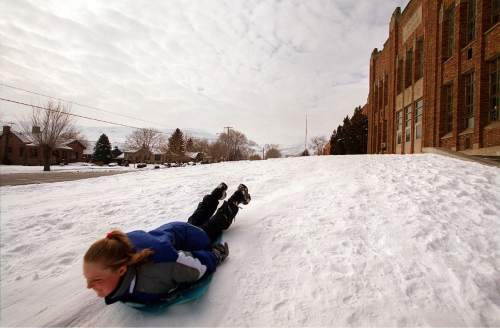This is an archived article that was published on sltrib.com in 2016, and information in the article may be outdated. It is provided only for personal research purposes and may not be reprinted.
The Legislature has boosted prospects that Salt Lake County's three small metro townships coming into existence in 2017 can attract more qualified candidates for their initial governing councils.
With only one dissenter, Rep. Mel Brown, R-Coalville, lawmakers finished signing off last week on a bill that would allow metro townships with fewer than 10,000 people to elect their councils at large rather than by district.
There had been concern that Copperton, White City and Emigration Canyon could have trouble filling five council seats, each representing a different geographical area of those small communities.
But that's what the Community Preservation Act required when it was enacted in 2015, triggering last November's election that converted unincorporated Salt Lake County into Millcreek City and five metro townships — the three small ones plus Magna and Kearns.
So the county surveyor and clerk's offices spearheaded a detailed mapping process used by the County Council to establish township district maps that met all legal obligations.
While the boundaries complied with "one person, one vote" principles, they seemed especially contorted in the small townships and often at odds with the act's intent to increase local representation.
In Copperton, for instance, three of its current community council members live in what would have been one metro township district. So only one could have served on the new metro township council — and two would have been excluded.
HB320, sponsored by Rep. LaVar Christensen, R-Draper, apparently rectified that troublesome situation in time (once Gov. Gary Herbert signs it into law) to give potential council candidates more time to assess the lay of the local political landscape.
The filing deadline for council positions is March 17.
"This will definitely make it easier for people to sign up and run. It's good to have flexibility for the smaller townships," said Alyson Heyrend, spokeswoman for county Mayor Ben McAdams, architect of the Community Preservation Act.
It also should help guarantee, she added, that each of the small townships has a solid chairperson who can represent his or her area on the governing board of the Greater Salt Lake Municipal Services District.
The district is a newly created legal entity that will use county employees to deliver city-type services (snowplowing, planning and zoning, street lighting, animal services and more) to residents of the metro township or any city that contracts for services.
Longtime community activist Paulina Flint, a White City resident also involved in the Association of Community Councils Together, said she believes this revision will help ensure this new form of government doesn't go awry.
"We don't want this metro township to become a cost-creating form of government," she said, contending that having at-large seats in the small townships will help ensure "we keep closest to what we have now in the community councils, which are alive and well."
As of Friday, only one person — Christopher Spagnuolo — had signed up for a White City township council position. But Flint expects that to change soon, noting that she and other people lobbying the Legislature for the revisions did not want to have conflicts of interest. They were waiting for the bill to pass before filing.
"In the political arena, because we're nonpartisan, it's just better if you keep your issues separate," she said. "It's cleaner and better that way."
Five candidates have filed already in Emigration Canyon — Bob Staggers, Rick Raile, Joe Smolka, Gary Bowen and Kathryn Christensen — while Ron Patrick and Chris Drent were the first two entries in the race to represent Copperton.
Because they have larger populations, Magna and Kearns are not affected by the legislation. With 10 days left before the filing deadline, interest in serving on the Magna township council is particularly high.
Six people are vying in district two (Brint Peel, Kelly Peterson, Mark Elieson, Paula Kunz, Troy Larsen and Dustin White) and four each in districts one (Steve Prokopis, Toni Sears, Dan Johnson, Georgia York) and four (Trish Hull, LaDell Bishop, Dan Cripps and Aaron Weight).
Two candidates each are in place in districts three (Dan Peay and Stuart Lawrence) and five (Steven Nosack and Eric Ferguson).
Less interest has been shown in Kearns, where Patrick Schaeffer is unopposed so far in district one, as is Tina Snow in district four. No one has signed up in district two. The two races shaping up are in district three (Ruby Brown and Dennis Walton) and district five (Kelly Bush and Brian Richards).
Nowhere is interest in elective office greater than in Millcreek, which will become the county's 17th city Jan. 1.
The race for mayor is up to four candidates (Fred Healey, Jeff Silvestrini, Phillip Archer and Edward Frank), while three people have signed up for the district one seat (Diane Angus, Scott Van Wagoner and Silvia Catten).
Five candidates have lined up in both district two (Tom Davis, John Douglas, Rivka Richman, Dwayne Vance and Dwight Marchant) and district three (Bob Shupe, Chaskey Barry, Jem Keller, Cheri Jackson and Jeffrey Waters).
Topping them all is district four, largely made up of Olympus Cove, where the eight candidates (a ninth withdrew) are Vaughn Howard, Robert Beardshall, Lisa Bagley, Barry Bowen, Bev Uipi, Seraya Amirthalingam, LaMont Tyler and Kurt Zimmerman.
Recorder review
Salt Lake County Council Chairman Max Burdick intends to hold a meeting Tuesday to discuss concerns about the "health and well being" of County Recorder Gary Ott.
Those concerns intensified last week with the disclosure of police reports about an incoherent, inadequately dressed Ott being rescued by officers while wandering on a remote stretch of highway in Tooele County on Jan. 29.
That incident revived fears discussed earlier around the County Government Center that the independently elected Ott's cognitive skills were diminishing and that his office was being run by his chief deputy, Julie Dole, and his assistant and girlfriend, Karmen Sanone.
All three deny these suspicions, contending Ott remains in charge.
Burdick said he wants council members to discuss the situation in a closed session with council attorney Jason Rose, the district attorney's office "and other individuals that may be deemed appropriate."
The Utah Open and Public Meetings Act allows closed-door discussion of "the character, professional competence, or physical or mental health of an individual."
The session is designed to be fair and respectful to "our friend Gary," Burdick said, but also to ensure "our recorder's office continues to function in a way that serves our citizens at the highest possible level."





